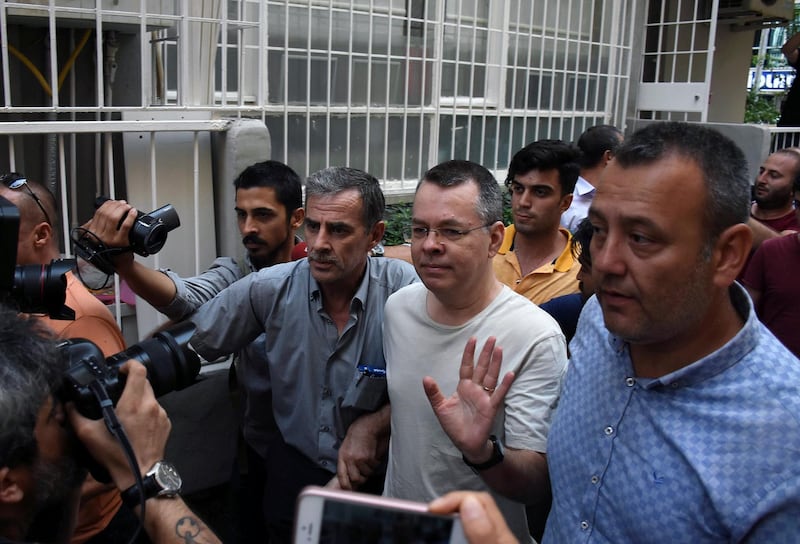With US sanctions and tariffs hitting Turkey this month for its refusal to release an American pastor, the relationship between the Nato allies is under serious pressure and there are fears for the regional impact.
Nine days after sanctioning two Turkish cabinet members, US President Donald Trump on Friday doubled steel and aluminium tariffs on Ankara, ramping up the pressure on the lira, which plummeted 20 per cent to the dollar
“Aluminium will now be 20 per cent and Steel 50 per cent. Our relations with Turkey are not good at this time!” Mr Trump tweeted.
Turkey is world’s sixth-biggest steel producer, and eighth largest steel importer for the US according to the International Trade Administration. It is, however, outside the top 15 for aluminium exports. Still, the move could affect $1.7 billion of Turkish exports.
A US official, speaking on condition of anonymity, told The National that the tariffs decision was among a number of options presented to Mr Trump.
The move follows the failure of US-Turkish talks in Washington this week to release Pastor Andrew Brunson from house arrest in Izmir after he was jailed in 2016 on charges of espionage. The Trump administration has significantly upped the pressure in the last two months to secure his release.
Experts, however, were split about Mr Trump’s tariffs decision with some fearing it could backfire on US-Turkish relations without helping Mr Brunson’s case.
Henri Barkey, a professor of International Relations at Lehigh University who follows Turkey closely and has been critical of its President, Recep Tayyip Erdogan, said the new tariffs are “an unnecessary escalation at a time when the decline of Turkish lira was already putting pressure on Turkey”.
He said that the decision “demonstrates that the US is not behaving rationally and is not showing patience when it is needed.”
While Mr Barkey advised for a one-on-one meeting between Mr Trump and Mr Erdogan to negotiate and de-escalate the situation, Steven Cook of the Council on Foreign Relations did not see a path to end the spat soon.
“It is hard to imagine how the United States and Turkey repair their relationship, which was already faltering, after this episode.”
"US and Turkey are breaking up," Mr Cook told The National, recommending that Washington instead focuses on "how the tanking of the Lira affects other emerging market currencies, and moving to contain the contagion."
_______________
Read more:
Erdogan tells US: Turkey will find new friends
Trump hits Turkey with doubled tariffs as lira tumbles
Turkey talks banking and Brunson in 'ongoing' US talks
Trump's targeting of Turkey spells danger for its economy
_______________
Others feared this would drive Turkey closer to Russia, and possibly affect US-Turkish cooperation in Syria. Mr Erdogan held a phone conversation with Russian President Vladimir Putin immediately after the tariffs announcement, and Russian foreign minister Sergey Lavrov is expected in Turkey on Monday. US Defense Secretary James Mattis called his Turkish counterpart Hulusi Akar to discuss defence relations, Syria and counter-terrorism.
But Aykan Erdemir, of the Foundation for Defense of Democracies, said Mr Trump’s tariffs announcement comes “at the worst possible time for Mr Erdogan” and fits with US strategy to increase pressure on Ankara until Mr Brunson is released.
“At this point, the ball is in Mr Erdogan’s court…who is unlikely to back down and will continue to dig himself and the Turkish economy into a deeper hole,” Mr Erdemir argued.
The Trump administration was expecting the release of Mr Brunson on July 18, the day of his appearance in court, but instead the ruling kept him in jail till his next hearing in October. A week later he was moved to house arrest.
According to the Washington Post, Mr Trump and Mr Erdogan agreed on a deal that would release Mr Brunson and, in exchange, Turkish national Ebru Ozkhan would be released by Israel. Ms Ozkhan was released on July 16.
Turkish outlets reported that Mr Erdogan is seeking the release of Mehmet Hakan Atilla, a Turkish banker serving a 32 months sentence in New York for evading Iran sanctions.
A diplomatic source, however, familiar with talks of Turkish deputy foreign minister Sedat Onal in Washington this week, told The National that exchanging Mr Brunson for Mr Atilla is not on the table from the US side.
Pressure on Turkey is also coming from US Congress that moved late last month to block further F-35 deliveries to Turkey until it cancels the S-400 defence system deal with Russia and Brunson is released. Another bill being debated calls to restrict international loans to Ankara until it frees Mr Brunson.





